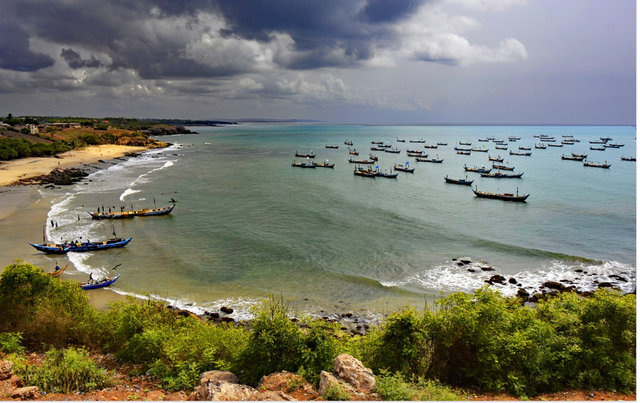Something about oil in Africa: Part 3

I think this will be the last post in the: "Something about oil in Africa" series
How can the oil benefit everyone?
The oil can cause great prosperity in a country, but it can also create as big conflicts. It's not just the sudden flow of money you have to allocate which is a problem, but the pollution the oil can also cause if the oil companies do not comply with the rules or if the nation is weak and does not have any real rules for environmental protection. Nigeria is proof of how it was just the pollution that created the conflict as it was the money and how a large multinational company like Shell was too big a mouthful for the weak Nigerian state.
Ghana is, as mentioned, a new country in oil production and the African Energy Policy Center (ACEP), giving two examples of the creation of two ponds that have been paid with the money from the oil can help to grow in the country. The two ponds are The Keyime Dam and The Ohawu Dam, the two ponds, in addition to creating humid areas, have also contributed to creating jobs. In these cases, Ghana has created jobs in agriculture, unlike Nigeria, where oil has destroyed agricultural pollution due to pollution associated with production. Annex 5 also shows that agriculture has and still has a significant impact on Ghana's GDP, although it can also be seen that GDP is not so dependent on agriculture, it is still an important factor in Ghana. One problem Peter Maas also mentions is that the oil is not so laborious, and the oil does not therefore cause direct employment and it can make it difficult to distribute the money. If you manage to use oil income in such a way that people get to work you can get the oil to create jobs. This may be a mockery to give the population part of the oil incomes even people in northern Ghana will benefit from the money despite the fact that the oil is being produced in the southern part of the country.

Can Ghana learn from Nigeria?
Shell in Nigeria has been under severe criticism because, as such, they have not given back to the local population, Peter Maas says that Shell, for example, has donated a large generator that would generate electricity to a whole village. Peter Maas accuses Shell for making only symbolic projects and donations, for example, the village could not use the large gasoline-powered generator, as they had no fuel for it, and Shell did not give them. So it is of the utmost importance that the creation of the projects that the oil pays for are also props the population can benefit from and not only look good at the paper. Shell today announces on the Dealer's website, to have more projects underway in Nigeria and especially in the Niger Delta where Shell's oil wells and refineries are located. Shell says on their website that about 20,000 jobs have been created in connection with oil production in Niger, but it can be discussed whether it is enough to say that oil production has been able to pay off. Nigeria is the seventh highest populated country in the world, and 20,000 jobs are not much compared to the jobs and housing coexistence the oil may have destroyed. It is difficult to find places in Nigeria where oil production has benefited the population, as 70% still live below the poverty line. However, it can be difficult to say how many jobs there or would have been in the Delta area, as oil production was already started in the 1960s.
Ghana has been an independent country since 1957, and has thus had time to develop as a nation, and they have had time to create a national identity. However, the national identity may well pave the way for the distribution of resources, the Danish Embassy in Ghana said that bribery and corruption to a lesser extent lie in their national identity. Something that the Danish embassy in Ghana also said was that they have tradition of education, which can be beneficial to the understanding of their society and the role that the oil can play in it. ACEP expresses concerns about the population's information that it is actually oil that has paid projects such as the two ponds, in order to understand the large investments it requires to create an oil production, the population must also understand that they are getting something out of it. AFCE tells in their analysis of oil-funded projects that none of the people asked from the areas where the two projects were carried out knew that it was actually oil-funded projects. ACEP has also released: '' Citizens' Guide to Petroleum Contracts in Ghana '', which tells us about how oil licenses work and informs the people about what the oil in their country may be of importance to them.

ACEP on oil discoveries
ACEP writes in: VFM analysis of oil-funded irrigation projects in Ghana '' on p. 38 their recommendations for governments' handling of the oil industry. They mention that they will advise the government to continue to promote the competitive selection of who is allowed to drill for oil so as to get transparency in who is chosen and why. They also recommend looking into the companies' history in oil extraction so that you get qualified and efficient companies to extract the oil. The past of oil companies that will extract the oil is likely to be of great importance, as big companies like Shell and Chevron do not have a history that has proved to bring prosperity. However, a company like Shell can live up to expectations of experience and efficiency. Shell also refers to social investment in the Nigerian communities, where they invested over $ 10 million in the education of the Nigerian youth in 2015. So one has to be critical of his choice of oil producer, and the major international companies that have the capital to produce efficient oil production often do not have a history from other countries that seem to be in the market.
Some of the projects Shell has had in Nigeria has been an attempt to promote business, for example, un-darned youth in entrepreneurship, they try to educate the population to start their own firms. It is a way that may prove to be good for the local population because if there is a local business community, business will probably be the supplier to some of the oil production needs. However, it is important if Ghana chooses to promote local business in such a way that it requires oil companies to make use of locals for the production of oil production.
Conclusion
Oil is a valuable product in our world, which is formed over millions of years. The oil is not found anywhere in the world as it requires some very special conditions in the ocean and the underground for the oil to be formed. Therefore, it is such a valuable and sought after product all over the world. Oil has in many cases not caused the riches you would think. The oil in countries such as Nigeria has become a thing that links with pollution and corruption. However, it has turned out to be able to open the doors too many coincidences if the money the oil causes is being used properly. Several countries in Africa have suffered from resource corruption, and it is difficult for you to avoid it. A country like Ghana is looking at the experiences Nigeria has had with their oil production and Ghana can openly know who has the rights to what does not make the same mistake as Nigeria has. Ghana will try through oil-funded projects to bring the money to the population so that they are not only divided into few hands, and they can try to inform the people about what the oil funds are going to mean to the country.